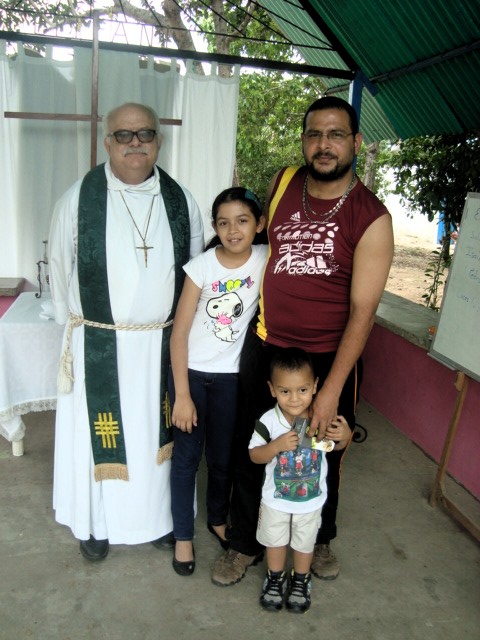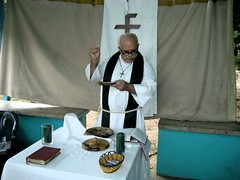 |
| My father, Rev. David T. Ernst, Sr. Photo taken by Charles O'Rear for the DocuAmerica Project, in Plymouth, Nebraska, 1973. |
I thought of my own father on Father's Day 2015.
For most of my life I resisted the thought of entering the ministry as my father had. I did not think I should make that decision just based on a desire to imitate my Dad and I did not think that I could imitate him. I could not be as patient and suffer fools as gladly as he did. Yet I always was fascinated by the stories of missionaries who carried the Word of God to far corners of the world, especially when they would tell those stories in person. But then, again, I doubted that I had what it took to leave behind everything familiar and adapt to a new language and culture. I thought perhaps if I could not be David Livingstone, I could be Henry Stanley, the intrepid journalist who found Livingstone after he had disappeared into the African bush.
Dad never pressured me into living up to any expectation that he had or expressed disappointment in me. But when he preached at my high school baccalaureate service, he was speaking to me as much as anyone else when he said, "Whatever you do in life, my wish for you is that you know Jesus Christ as your Lord and Savior."
As the years passed by, I heard more stories of people who spent their retirement years as missionary volunteers. I began to think maybe that was something that I could do someday. Finally, when I was 42 years old, I reached a turning point in my life. My chosen career path had not taken me where I wanted to go. I had no family, no home, no business of my own to tie me down. I was ready to try something new.
That was the year that, after taking his morning walk and working in his garden all afternoon, my father passed, instantly, painlessly from this world. His funeral was a beautiful testimony to his faith, as his entire life had been. In his funeral sermon, Pastor Bruce Keseman of Christ Our Savior Lutheran Church, Freeburg, Illinois, said that my father had spoken to the world in a language that it did not understand, the language of God's love, but he had gone to a place where that was the only language spoken. Dad's epitaph was the same as his confirmation verse: "For I am not ashamed of the gospel of Christ: for it is the power of God unto salvation to every one that believeth; to the Jew first, and also to the Greek." (Romans 1:16)
I did not decide to enter the mission field then and there. But I did realize that I wanted my life to end as his did, as a confession of what I truly believed. Also I began to ponder that life on this earth is indeed very brief and that there was no guarantee that I would have many years ahead of me to do what I felt moved to do.
Thanks be to God doors began opening for me from that point onward and so, here I am, doing what once I thought I would not be able to do. Above all, I give thanks that I had such a pastor and father to guide me until I was ready to take the steps than needed to be taken.
Dad never pressured me into living up to any expectation that he had or expressed disappointment in me. But when he preached at my high school baccalaureate service, he was speaking to me as much as anyone else when he said, "Whatever you do in life, my wish for you is that you know Jesus Christ as your Lord and Savior."
As the years passed by, I heard more stories of people who spent their retirement years as missionary volunteers. I began to think maybe that was something that I could do someday. Finally, when I was 42 years old, I reached a turning point in my life. My chosen career path had not taken me where I wanted to go. I had no family, no home, no business of my own to tie me down. I was ready to try something new.
That was the year that, after taking his morning walk and working in his garden all afternoon, my father passed, instantly, painlessly from this world. His funeral was a beautiful testimony to his faith, as his entire life had been. In his funeral sermon, Pastor Bruce Keseman of Christ Our Savior Lutheran Church, Freeburg, Illinois, said that my father had spoken to the world in a language that it did not understand, the language of God's love, but he had gone to a place where that was the only language spoken. Dad's epitaph was the same as his confirmation verse: "For I am not ashamed of the gospel of Christ: for it is the power of God unto salvation to every one that believeth; to the Jew first, and also to the Greek." (Romans 1:16)
I did not decide to enter the mission field then and there. But I did realize that I wanted my life to end as his did, as a confession of what I truly believed. Also I began to ponder that life on this earth is indeed very brief and that there was no guarantee that I would have many years ahead of me to do what I felt moved to do.
Thanks be to God doors began opening for me from that point onward and so, here I am, doing what once I thought I would not be able to do. Above all, I give thanks that I had such a pastor and father to guide me until I was ready to take the steps than needed to be taken.
 |
| Jhoan Andrés Leal Santana with his father, Juan Carlos, and sister, Maria. |
But I did not talk about my own experience on that Sunday morning. Instead I preached on all of the 15th chapter of the Gospel according to St. Luke, which contains not one, but three parables about God's desire to save sinners. The longest and most appropriate for Father's Day is known as the Parable of the Prodigal Son, although it really is about two sons.
Perhaps everyone recalls the younger son who takes his inheritance and squanders it on an immoral lifestyle. The Greek text literally means "living unsaved" (ζῶν ἀσώτως), which one could take to mean either wastefully, in a material sense, or sinfully in a spiritual sense. Reduced to hunger and poverty, he returns to his father, hoping only to be accepted as a laborer on the family farm. Instead, the father restores him to sonship and throws a big party in honor of his return.
However, the parable also includes the rebellion of the older son, who followed all his father's rules until it appeared that he would not receive preferrential treatment. He, like the self-righteous Pharisees to whom Jesus told the parable, was reluctant to celebrate the repentance and salvation of his younger brother who received the father's undeserved favor.
The father in the parable represents God the Father, of whom our earthly fathers are only images. As a loving Father, He desires that all His children be restored to the family, not lost in sin. We preach the Law, God's universal will for how we should live our lives, but which in itself only condemns us for all are sinners and have disobeyed it, to call sinners to repentance and salvation.
For that reason, the other two parables in Luke 15, that of the lost sheep and the lost coin, both conclude with the assertion that God's holy angels rejoice over the salvation of even one sinner. The entire chapter, of course, refutes the Calvinist errors of limited atonement and double predestination, which lead either to despair on the part of the sinner or the self-righteousness of the Pharisees. God the Father desires that all might be saved and therefore sent His Son to die for all on the cross. In that we have our peace and hope. Amen.






